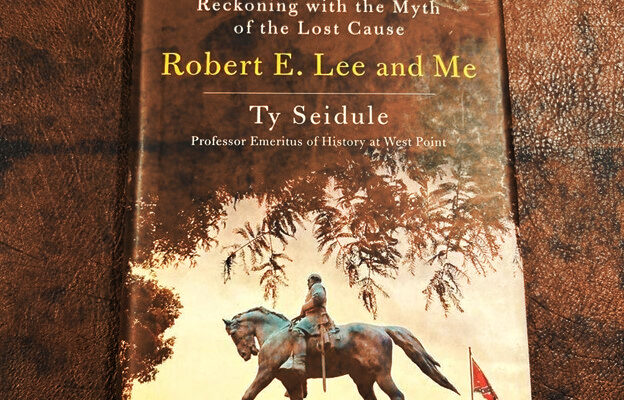Born and raised in the South, Ty Seidule is a Professor Emeritus of History at West Point and the author of Robert E. Lee and Me: A Southerner’s Reckoning with the Myth of the Lost Cause.
In his book, Seidule describes his Southern upbringing and acceptance of “lost cause myths” invented by Southern post-war authors. However, through historical research, Seidule became enlightened, which turned him from his sinful thoughts as he embraced the standard version of the war and the South.
I became excited after hearing about his book from an acquaintance because his story was, in many ways, so much like my own. Except I went in the reverse direction. In my book, Defending Dixie’s Land, I reveal how I was raised in Vermont and indoctrinated into the winner’s version of the war. However, after years of investigation into original sources and reading a diverse range of authors and historians, I came to the opposite conclusion that Seidule did. The American Civil War is no abnormality; the winner writes the history.
Given our similar and divergent stories, I contacted the good professor for some friendly discussion or intense debate, and I await his reply. I hope the delay is due to his desire to read my book first.
My focus has always been on the war itself and what led to it, leaving much of Seidule’s book’s content outside my interest. The central theme of his work is an attempt to convince readers the South has an awful history of white supremacy and that the Confederates were traitors to the U.S. Constitution and seceded to form a slave republic. Therefore, they deserve no honor from a nation they fought against.
Seidule portrays the South as operating in the typical white supremacist mode and declares the North’s victory more glorious and morally just than World War 2! Seidule informs us that on the typical Southern plantation, “mass atrocities” occurred along with “unspeakable cruelty” and “torture.” Slaves lived under the lash and in constant fear of being sold. Meanwhile, slave women were unprotected from rape. Rape was part of the culture, according to the professor. He cites few sources for his claims and relies almost wholly on Frederick Douglass, even claiming that all of the Southern slaves’ experiences were like Douglass’s, “or worse.” Thus, in his eyes, ending Southern slavery via war (another fascinating claim of his) was more a cause for praise!
I question some of his historical judgment, as he fails to distinguish the modern KKK that originated in the 1920s from the original Reconstruction Klan that arose after the war (in response to atrocities against Southerners by the federal government, Union League, carpetbaggers, etc.). While pointing to acts of racism in the South, he seems to believe the North is innocent of all charges. He seemed clueless about the fact that the North maintained slavery for as long as the South and had its incidents of prejudice both before and long after the war. Further, instead of placing blame on Reconstruction policies and the war itself for degrading racial relations in the South, he blames Southerners who had no choice and had the situation forced on them.
Likewise, over and over, he refers to the United States in its original form as a democracy, the form of government the Founders despised. One of the leading causes of secession was that the Republicans under Lincoln were transforming the Republic (see Article 4 Section 4 of the Constitution) into a democracy. He claims the Confederate Constitution would not allow states to abolish slavery, and its purpose was to create a slaveholder republic; he honestly believes the Confederate armies were smaller not because of population differences but because their cause was not as just!
His mistaken understanding of various historical subjects also led to his misunderstanding of the causes of Southern secession. Seidule seems ignorant of antebellum politics and the Union as it was originated and intended. Therefore, he writes of the South, “sure they fought for states’ rights, states’ rights to have slaves.”
He failed to mention that this right was already ensured in the South, and that the Corwin Amendment, which Lincoln did not oppose, attempted to make it permanent forever in the U.S. Constitution. But had the professor understood the Republic and Union before Lincoln, and the war that destroyed it, he would know that when slavery was mentioned as a cause of secession, this was not due to the preservation of it but to the prevention of the federal government from intruding on the rights of the states over the issue of slavery. Regardless of the issue, states’ rights were the concern (as they always had been). The current issue happened to be slavery, but the battle was over preserving the Union. This is vital to understand, and I spent over a chapter on this issue alone. Once you understand how the Union operated as a Republic before the Civil War, documents like the South Carolina secession document Seidule cites as proof the South left to preserve slavery can be placed in their proper context and fully understood. When this is done, one cannot claim secession was solely to keep slavery.
Seidule ignores the many causes that the South mentioned as to why they left the Union (my book has over 90 pages full of original sources directly related to the causes of secession) and he fully ignores the Upper South’s causes and instead attempts to lump them in with the Cotton States where slavery was one of the issues.
He uses the standard arguments, Alexander Stephens’ Cornerstone Speech, the Mississippi and South Carolina secession documents, and a few others to claim the South left only to preserve slavery. Most of his arguments are refuted in my book’s responses. In the end, Seidule carefully selected limited data that implies secession was over slavery, ignoring context, and the massive amount of data contradicting his thesis. Yet, over and over, he talks about discussions he has had with people who, for some reason, don’t accept his arguments. Perhaps because they are aware of his faulty argumentation and lack of evidence, as opposed to the wealth of evidence that contradicts it?
Seidule is missing the mark because he is emotionally attached to his conclusion. He displays time and again his white guilt and shame for believing in the “lost cause myths.” He feels that in order to be just, he must repent of his white Southern heritage. The myths he learned as a Southerner, he says, promote a racial hierarchy and white supremacy, yet his book, complete with myths itself, does the same, only it places white owners at the bottom of his hierarchy.
-By Isaac C. Bishop
A lifelong Vermonter, Isaac C. Bishop is the author of Defending Dixie’s Land: What Every American Should Know About The South And The Civil War.

O I’m a good old rebel, now that’s just what I am. For this “fair land of freedom” I do not care at all. I’m glad I fit against it, I only wish we’d won, And I don’t want no pardon for anything I done.






“Seidule portrays the South as operating in the typical white supremacist mode and declares the North’s victory more glorious and morally just than World War 2!”
(Maybe so, but only because Sherman didn’t have B29’s and phosphorous bombs.)
I wouldn’t bother trying to engage this Southern renegade in meaningful debate. He’ll have to avoid any association with you to protect his emeritus emoluments and will probably receive many book awards for his ‘research’ and repentances.
Sad, but true.
Excellent article! Definitely buying your book. I’ve known a few Vermonters who hold the same resolutions. Sane people understand that the South’s cause was the same as the founders. Both republics had institutional slavery, a point lost on propagandist like TY boy.
This fact is beautifully articulated in several of the works of your namesake, most notably perhaps in his first-hand biography of the life of Stonewall Jackson (you know it already, so I won’t quote from it). This guy Ty Seidule is literally the personification of a bad joke in historical parlance re: the WBTS. Personally, I wouldn’t even grant him the title of “Southern renegade,” with all due respect to German Confederate. He may well be a “renegade” by definition, but the “Southern” qualifier is way too good for him, and likely isn’t accurate in any case, his “born and raised” qualifications notwithstanding.
If I should ever meet Seidule, I would say the following to him: “Like Judas, you’ve received your equivalent of thirty pieces of silver, paid in the modern currency of liberal Establishment approval.
“To his credit, Judas at least had the decency to go hang himself after his act of treachery. I doubt you have that much character.”
Beautiful comment Roland! The same analogy occurred to me.
Thank you all for your support! Yes even in Vermont the truth is known by some.
Two things:
1. That this man went to West Point and that he does not believe in the Confederacy is opposite of Robert E. Lee. There should be no “Robert E. Lee and Me” in the title. It should be “William Sherman and Me.” Sherman “resided” in the South for a period of time and went to West Point, so he has more in common with the latter.
2. He will not debate you, for he cannot debate you. Bloviations, platitudes, bromides, and banalities are not debatable. They are only extinguishable. He is a scalawag with stripes.
I am really enjoying your book! I am just glad to finally have documented a lot of the true facts about why the South left the union. So many of the things you listed, I sort of knew before hand by using some light research and plain and simple rational thought about how reality in the South is even in my lifetime. It is great to finally have someone who did the research and shows contemporaneous documentation that the War of Northern Oppression was far different from what we have had drilled by our oppressors into our heads all these years.
I purchased your book Mr.Bishop and will be reading it directly.It looks to be very good.Thank you for your efforts on behalf of the good and honorable Southern Christian people who have been so maligned.God bless you and all here in good faith.Christ is Lord.Also thanks to all the informative and uplifting commenters who I enjoy as well.